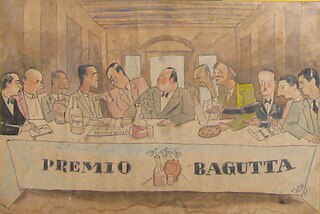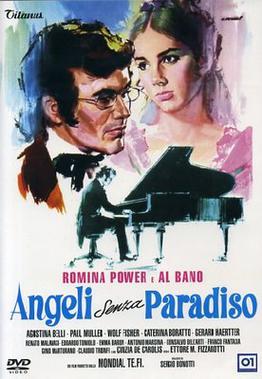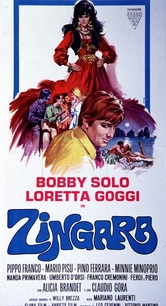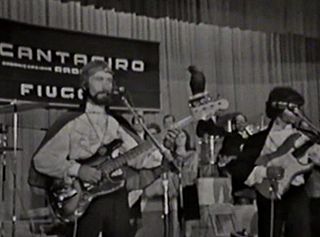Related Research Articles

Francesco Guccini is an Italian singer-songwriter (cantautore). During the five decades of his music career he has recorded 16 studio albums and collections, and 6 live albums. He is also a writer, having published autobiographic and noir novels, and a comics writer. Guccini also worked as actor, soundtrack composer, lexicographer and dialectologist.

Ugo Tognazzi was an Italian actor, director, and screenwriter.

The Bagutta Prize is an Italian literary prize that is awarded annually to Italian writers. The prize originated among patrons of Milan's Bagutta Ristorante. The writer Riccardo Bacchelli discovered the restaurant and soon he regularly gathered numerous friends who would dine there together and discuss books. They began charging fines to the person who arrived last to an appointed meal, or who failed to appear.

Afterhours is an Italian alternative rock band. The band was named after the Velvet Underground song of the same name.
De De Lind was a short-lived Italian progressive rock band active in the early 1970s. The band only released one album and four singles over the five years of its existence.
Umberto Barbaro was an Italian film critic and essayist.

Calogero Alessandro Augusto Calà, known by his stage name Jerry Calà, is an Italian actor, filmmaker, comedian and singer who has written, directed, and acted in multiple film and television projects. He is considered one of the most popular Italian comedians of the eighties and nineties in his country.

The musicarello is a film subgenre which emerged in Italy and which is characterised by the presence in main roles of young singers, already famous among their peers, and their new record album. In the films there are almost always tender and chaste love stories accompanied by the desire to have fun and dance without thoughts. Musicarelli reflect the desire and need for emancipation of young Italians, highlighting some generational frictions. The genre began in the late 1950s, and had its peak of production in the 1960s.

Pino Rucher was an Italian guitarist active in orchestral settings and in film soundtracks.

Angeli senza paradiso is a 1970 Italian "musicarello" directed by Ettore Maria Fizzarotti. It is an unofficial remake of the 1933 film Gently My Songs Entreat by Willi Forst.
The Nastro d'Argento is a film award assigned each year, since 1948, by Sindacato Nazionale dei Giornalisti Cinematografici Italiani, the association of Italian film critics.
Confusional Quartet is an Italian new wave band, which was active from 1978 to 1982, and then again after reforming in 2011 until present.

Carla Mignone, known by her stage name Milly, was an Italian singer, actress and cabaret performer.

Zingara is a 1969 Italian "musicarello" film directed by Mariano Laurenti. It is named after the Bobby Solo's hit song "Zingara".

Tears on Your Face is a 1964 Italian "musicarello" film directed by Ettore Maria Fizzarotti. It is named after the Bobby Solo's hit song "Una lacrima sul viso".

Veronica Atzei – better known by her stage name Bianca Atzei – is an Italian singer and television personality.

Il ragazzo che sorride is a 1969 Italian "musicarello" film directed by Aldo Grimaldi and starring Al Bano and Susanna Martinková.

I Corvi is an Italian beat group who were successful in the 1960s.

Francesco Fiorentino was an Italian philosopher and historiographer.

Anna Maria Bottini was an Italian actress.
References
- ↑ Mauro "Shake" Ferracini (April–June 2010). "Intervista ad Umberto Bultrighini". Jamboree . No. 69. Maurizio Maiotti.
- ↑ Marco Dellabella (2009). Da Woodie Guthrie a Woodstock. Nascita e Sviluppo Della music rock Dalle Radici folk e blues al movimento hippy. Kipple Officina libraria.
- ↑ Rizzi 1993, p. 185.
- ↑ Elisabetta Fazzini; Giorgio Grimaldi, eds. (2015). Ricerche e perspectives di Teatro e Musica. LED Edizioni Universitarie di Lettere, Economia, Diritto.